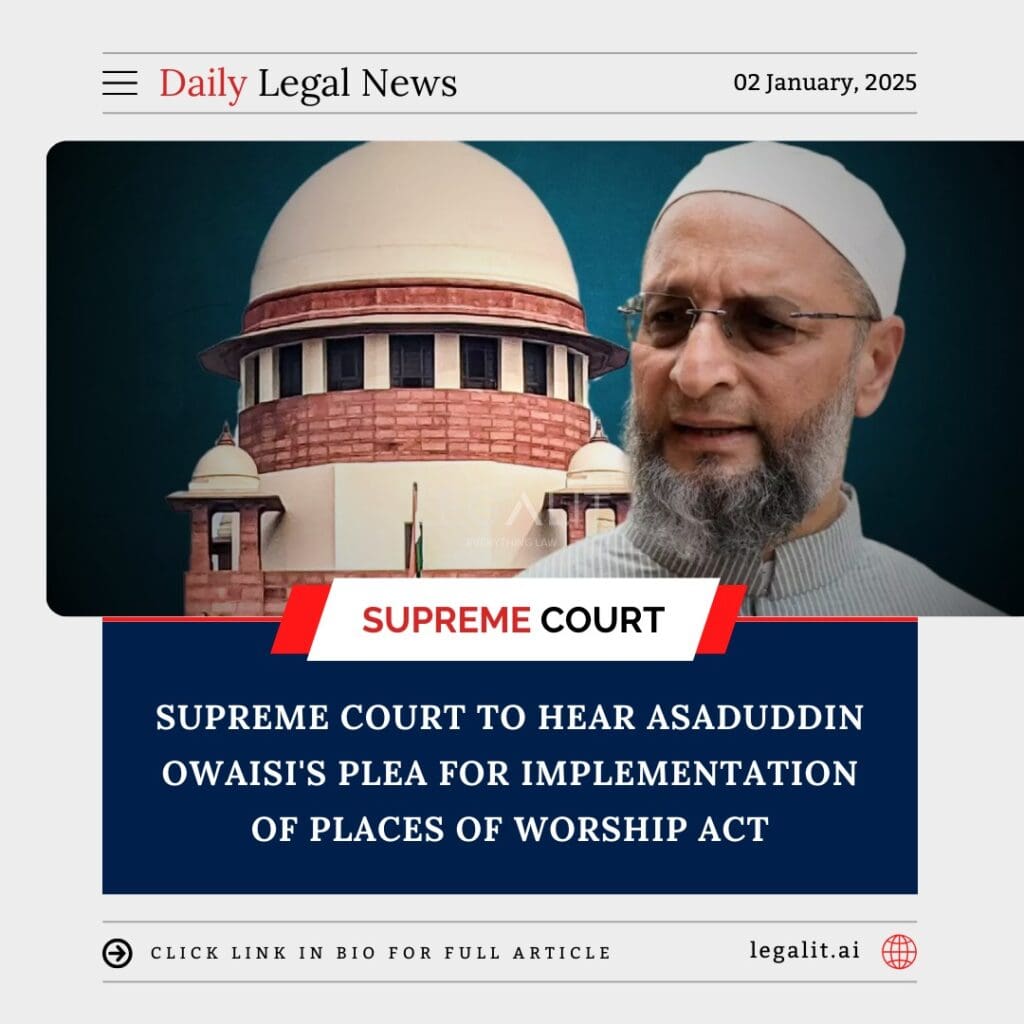
The Supreme Court of India has agreed to hear a petition filed by Asaduddin Owaisi, a Member of Parliament and President of the All India Majlis-e-Ittehad-ul-Muslimeen (AIMIM), seeking the implementation of the Places of Worship (Special Provisions) Act, 1991. Owaisi’s petition urges the government to enforce the provisions of the Act, which prohibits the conversion of any place of worship and mandates that the religious character of a place of worship as it existed on August 15, 1947, must remain unchanged.
1. Background of the Places of Worship Act
The Places of Worship (Special Provisions) Act, enacted in 1991, was designed to maintain the status quo of religious sites across India, preventing the alteration of the religious nature of any place of worship. The Act specifically prohibits the conversion of religious places and establishes that no place of worship should be altered or converted from one religion to another.
The Act was passed with the intention of preserving communal harmony and preventing the recurrence of religious conflicts over places of worship. Under its provisions, the status of all religious places as they were on August 15, 1947, the day India gained independence, should remain the same, and no person or group should alter the religious character of any site.
2. Owaisi’s Petition and Key Arguments
In his petition, Asaduddin Owaisi has raised concerns about the implementation of the Places of Worship Act, specifically calling for the government to enforce the law effectively. He argues that certain religious sites across India have faced threats of being altered or even demolished, which could lead to tensions and communal unrest.
Owaisi’s plea emphasizes that the law must be upheld to preserve the secular fabric of India and prevent any attempts to alter the religious character of significant historical and cultural sites. His petition requests that the Court direct the government to take necessary actions to ensure compliance with the Act and address any violations.
The petition also seeks to clarify the legal position regarding the implementation of the Act, particularly regarding the need for the government to take proactive steps in protecting these sites. Owaisi contends that the law is crucial for maintaining communal harmony and upholding India’s pluralistic values.
3. The Political and Social Context
Owaisi’s plea comes against the backdrop of several high-profile disputes over places of worship in India, most notably the Babri Masjid-Ram Janmabhoomi case, which saw the demolition of the Babri Masjid in 1992 and the subsequent legal and political battles over the site. The Places of Worship Act was passed in the aftermath of this incident to prevent similar conflicts from arising in the future.
In recent years, there have been increasing concerns about attempts to alter the status of religious sites in various parts of India, leading to tensions between different religious communities. Owaisi, known for his advocacy of Muslim rights and secularism, has consistently raised his voice against efforts to change the religious character of such sites.
4. Legal and Constitutional Implications
The Supreme Court’s decision to hear Owaisi’s plea holds significant legal and constitutional implications. If the Court decides to address the issue, it could clarify the interpretation and scope of the Places of Worship Act, potentially reinforcing its legal standing and enforcing its provisions more strictly.
The petition may also spark a larger discussion on the role of the judiciary in protecting religious sites and ensuring that the principles of secularism enshrined in India’s Constitution are upheld. The decision could impact how the government and religious groups approach disputes over places of worship in the future.
5. Broader Impact and Public Response
The outcome of Owaisi’s plea will likely resonate across the political and social landscape of India. If the Supreme Court rules in favor of enforcing the Places of Worship Act, it could send a strong message about the importance of preserving religious harmony and the rule of law. On the other hand, if the Court does not intervene, it may leave the door open for further legal challenges and disputes over religious sites.
The petition has already sparked considerable debate, with various religious and political groups weighing in on the issue. Supporters of the Places of Worship Act argue that it is essential for maintaining peace and preventing communal violence, while opponents may view it as an infringement on the rights of religious communities to contest historical claims over certain sites.
Conclusion
As the Supreme Court prepares to hear Asaduddin Owaisi’s plea, the case is poised to become a focal point in the ongoing debate about religious identity, communal harmony, and the protection of cultural heritage in India. The Court’s decision on this matter could have far-reaching consequences, not only for the legal framework surrounding places of worship but also for the broader question of how India balances its secular principles with the rights of religious communities. The upcoming hearing will be crucial in determining the future direction of this contentious issue.